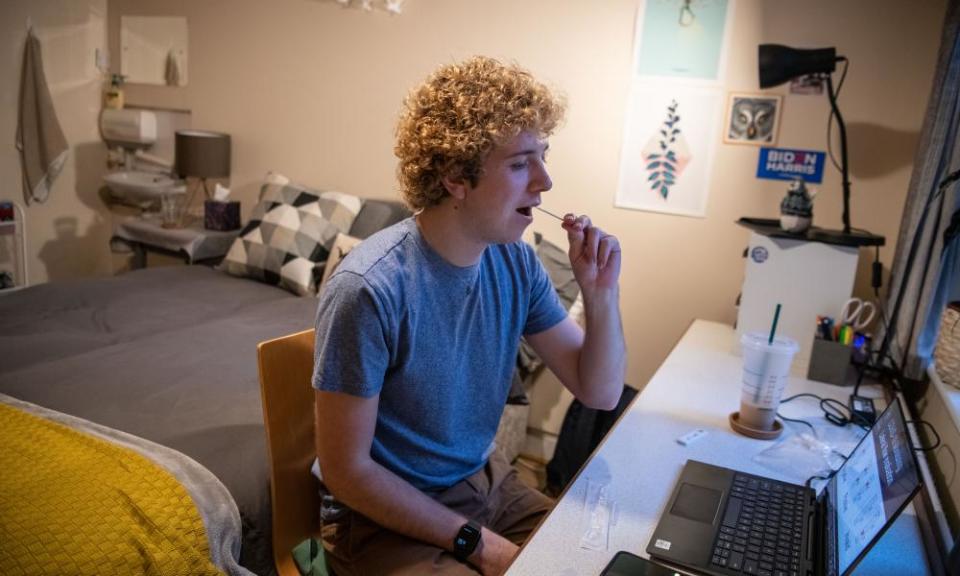Covid self-isolation cut to seven days with negative test in England

Public health bosses say move for those who test negative on days six and seven will help support essential services
The Covid self-isolation period has been cut to seven days in a move that could save Christmas for thousands of people and ease mounting staff shortages.
From Tuesday, new guidance will enable the 10-day self-isolation period for vaccinated people in England who have tested positive for coronavirus to be reduced by three days if they get the all-clear from lateral flow tests.
Related: No new Covid restrictions before Christmas, Boris Johnson confirms
People who receive negative results from tests taken 24 hours apart on day six and day seven of their self-isolation period will no longer have to self-isolate for the full 10 days, the UK Health Security Agency (UKHSA) said.
Those who leave self-isolation on or after day seven are “strongly advised” to limit close contact with other people in crowded or poorly ventilated spaces, work from home and minimise contact with anyone who is at higher risk of severe illness if infected with Covid-19, the agency added.
Watch: COVID-19: Self-isolation period cut from 10 days to seven for those with negative lateral flow results on day six and final day
There is no change to the guidance for unvaccinated positive cases, or unvaccinated contacts of positive cases, who are still required to self-isolate for the 10 full days after their date of exposure to the virus.
Sajid Javid, the health secretary, said: “We are reducing the self-isolation period from 10 days to seven if you test negative on a lateral flow test for two days running. It’s vital people keep playing their part by testing regularly and isolating if they test positive. And I urge you to get boosted now to protect yourself and those around you.”
Some businesses had feared that if the rules were not relaxed then they could be crippled by mass staff absences. However, scientists and others have raised concerns, arguing that shortening the self-isolation regime could increase the likelihood of Covid spread, given lateral flow tests are not entirely reliable indicators of whether someone is infected.
Analysis by the UKHSA suggests that a seven-day isolation period alongside two negative lateral flow test results has nearly the same protective effect as a 10-day isolation period without lateral flow testing.
The new approach reflects the latest evidence on how long infected people transmit the virus for and will support essential public services and supply chains over the winter, while still limiting the spread of the virus, UKHSA said.
The UKHSA chief executive, Dr Jenny Harries, said: “Covid-19 is spreading quickly among the population and the pace at which Omicron is transmitting may pose a risk to running our critical public services during winter.
“This new guidance will help break chains of transmission and minimise the impact on lives and livelihoods. It is crucial that people carry out their lateral flow tests as the new guidance states and continue to follow public health advice.”
Watch: What is a Rapid Lateral Flow Test?

 Yahoo News
Yahoo News 
